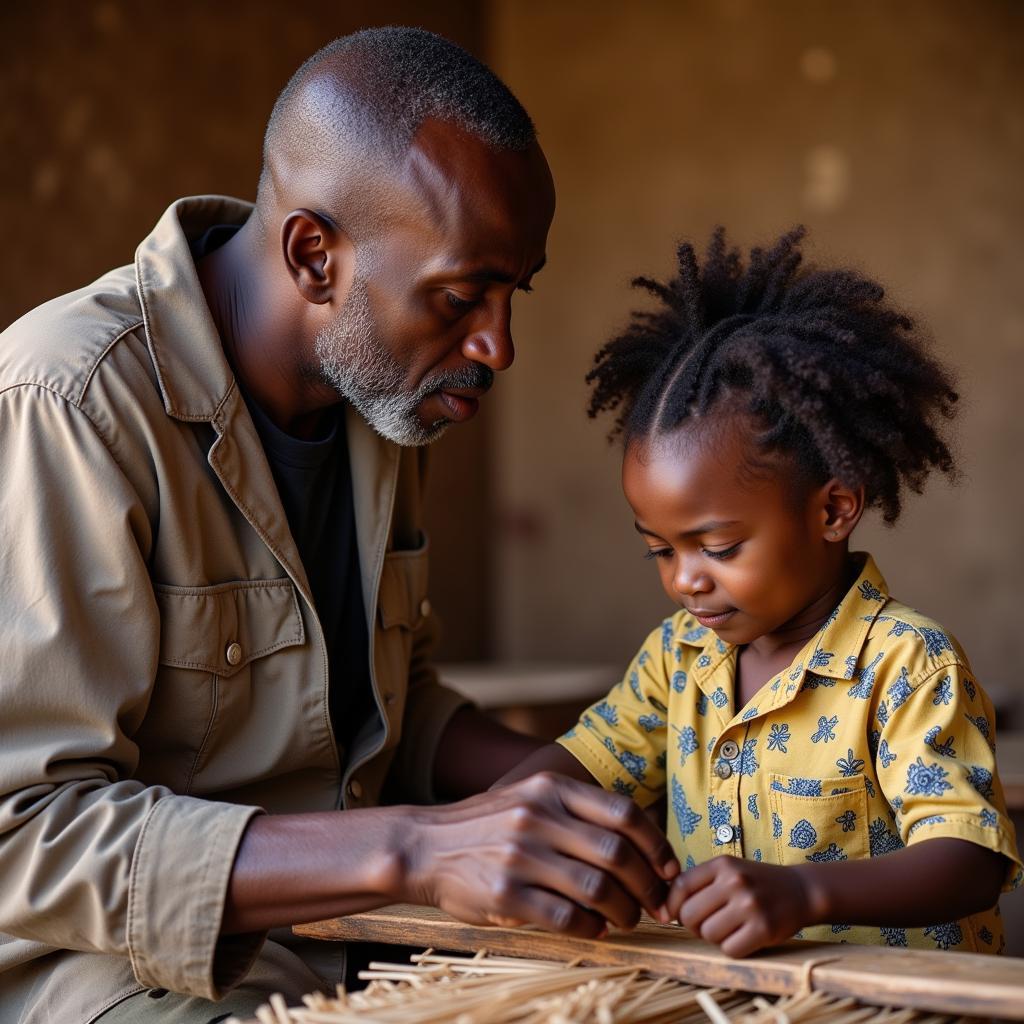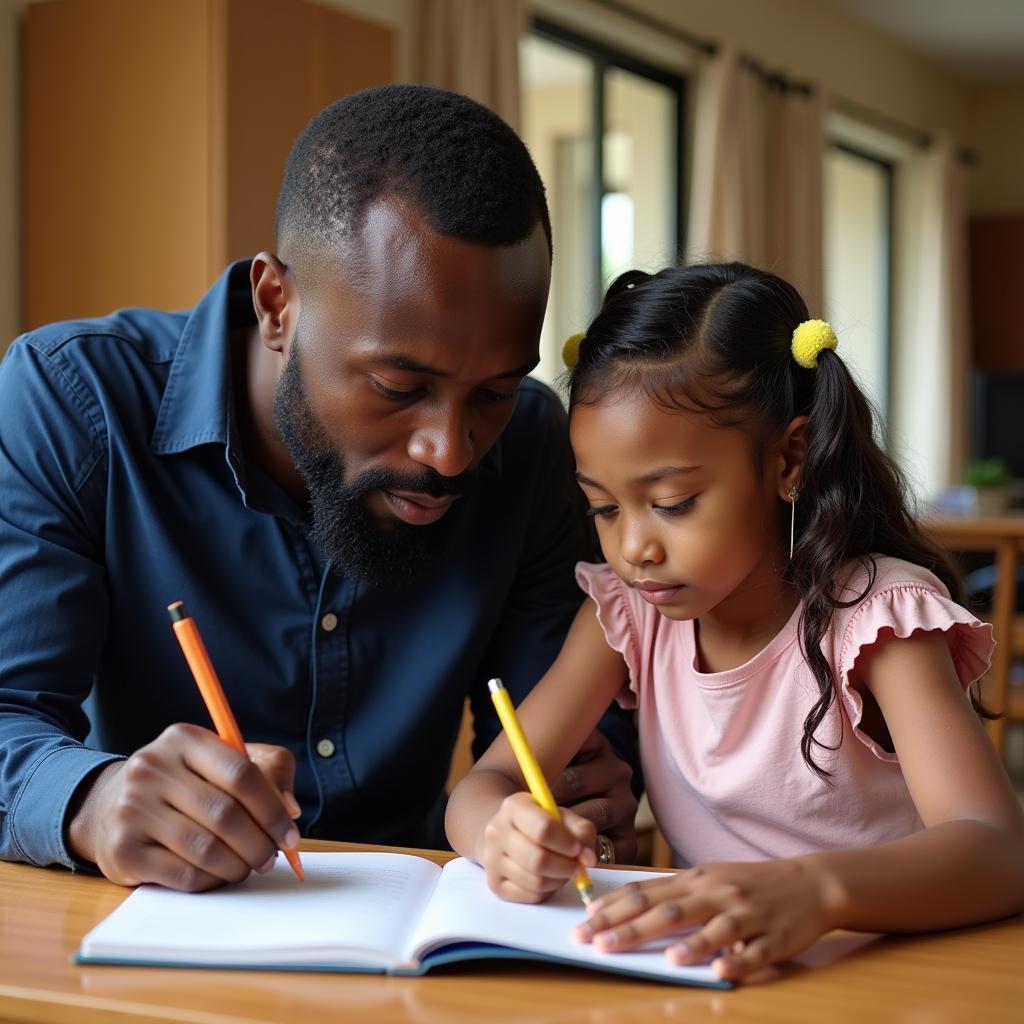The African Father: A Pillar of Strength, Wisdom, and Love
The African Father often occupies a unique and complex role within the family and community. He is seen as a provider, a protector, a disciplinarian, and a source of wisdom. This article delves into the multifaceted nature of the African father, exploring the various dimensions of his influence and the evolving dynamics of fatherhood across the diverse cultures of the continent. We’ll examine the challenges and triumphs, the expectations and realities, and the enduring legacy of the African father. See an example of an african father talking to son.
The Traditional Role of the African Father
Historically, the African father held a position of authority and respect. He was responsible for the family’s economic well-being, often making decisions about land ownership, livestock, and other resources. His role extended beyond the immediate family, often including responsibilities within the larger kinship network and community. Discipline was a cornerstone of his parenting style, instilling values of obedience, respect for elders, and hard work. However, this traditional image often lacked emotional expressiveness, leading to a perceived distance between fathers and their children.
 African Father Teaching Son Traditional Skills
African Father Teaching Son Traditional Skills
The Evolving Dynamics of African Fatherhood
Modern influences, including globalization, urbanization, and changing gender roles, have impacted the traditional role of the African father. Increasingly, fathers are becoming more involved in the emotional and nurturing aspects of parenting. They are taking a more active role in childcare and education, challenging the traditional division of labor within the family. This shift towards a more involved and emotionally present father figure is contributing to stronger family bonds and improved child development. African father son relationships are evolving.
What are some common challenges faced by African fathers today?
Many African fathers face the challenge of balancing traditional expectations with modern realities. Economic pressures, unemployment, and migration can strain family relationships and limit their ability to provide adequately. Furthermore, societal expectations of stoicism can make it difficult for fathers to express their emotions and connect with their children on a deeper level.
How are African fathers adapting to these challenges?
African fathers are adapting by embracing new parenting styles that prioritize communication and emotional connection. They are actively seeking support networks and resources to navigate the complexities of modern fatherhood. Many are challenging traditional gender roles and actively participating in household chores and childcare.
 Modern African Father Playing with Children
Modern African Father Playing with Children
Celebrating African Fatherhood: Beyond Stereotypes
It is crucial to recognize the diversity of experiences within African fatherhood. Generalizations about “the African father” fail to capture the nuances and variations across the continent’s vast array of cultures and traditions. From the nomadic pastoralists of East Africa to the urban dwellers of West Africa, the expression of fatherhood takes on many forms. Recognizing this diversity allows us to appreciate the richness and complexity of the African family structure. Check out how we celebrate African Fathers Day.
Dr. Adebayo Ojo, a prominent sociologist specializing in African family dynamics, states, “African fatherhood is a tapestry woven with diverse threads of tradition, modernity, and individual experience. We must move beyond simplistic stereotypes and embrace the full spectrum of its expression.”
The Impact of an Involved African Father
Research consistently shows the positive impact of involved fathers on child development. Children with engaged fathers tend to perform better academically, have higher self-esteem, and develop stronger social skills. They are also less likely to engage in risky behaviors. The presence of a supportive and loving father figure is a powerful protective factor for children, contributing to their overall well-being and future success. More information can be found on resources related to african father and son.
 African Father Supporting Daughter's Education
African Father Supporting Daughter's Education
Conclusion
The African father plays a vital role in shaping families and communities across the continent. While traditional roles continue to evolve, the core values of providing, protecting, and guiding remain strong. By recognizing the diversity, challenges, and triumphs of African fatherhood, we can gain a deeper appreciation for its significance and its enduring legacy. The African father remains a pillar of strength, wisdom, and love, playing a crucial role in shaping the future generations of Africa. You may enjoy some african father comedy.
FAQ
- What are some common traditions associated with African fatherhood?
- How has colonization impacted the role of the African father?
- What are some ways to support African fathers in their parenting journey?
- How are African fathers addressing issues like gender equality and education?
- What are some resources available for African fathers seeking support and guidance?
- How can we challenge negative stereotypes about African fathers?
- What are some examples of successful fatherhood programs in Africa?
Situations related to frequently asked questions.
- A young father struggling to balance work and family responsibilities.
- An older father navigating the changing cultural landscape and its impact on his relationship with his children.
- A father separated from his family due to migration, seeking ways to maintain connection and support.
Suggested Further Reading
- Articles on African family structures and parenting styles.
- Resources for fathers seeking support and guidance.
- Studies on the impact of father involvement on child development.
If you need further assistance, please contact us via Phone: +255768904061, Email: kaka.mag@gmail.com or visit our address: Mbarali DC Mawindi, Kangaga, Tanzania. We have a 24/7 customer service team.